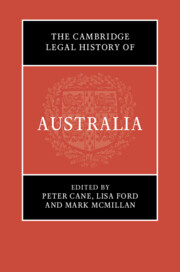Book contents
- The Cambridge Legal History of Australia
- The Cambridge Legal History of Australia
- Copyright page
- Contents
- Figures
- Maps
- Contributors
- Maps
- 1 Editors’ Introduction
- I Cultures of Law
- II Public Authority
- III Public Authorities in Encounter
- IV Land and Environment
- V Social Organisation
- 18 Colonial Law and its Control of Aboriginal and Torres Strait Islander Families
- 19 The Legal History of Non-Indigenous Marriage
- 20 Protection Regimes
- 21 Economic and Social Welfare
- 22 Civil Rights and Indigenous People
- 23 Rights
- 24 Citizenship and Immigration
- VI Social Ordering
- VII Reckonings
- Index
19 - The Legal History of Non-Indigenous Marriage
from V - Social Organisation
Published online by Cambridge University Press: 04 August 2022
- The Cambridge Legal History of Australia
- The Cambridge Legal History of Australia
- Copyright page
- Contents
- Figures
- Maps
- Contributors
- Maps
- 1 Editors’ Introduction
- I Cultures of Law
- II Public Authority
- III Public Authorities in Encounter
- IV Land and Environment
- V Social Organisation
- 18 Colonial Law and its Control of Aboriginal and Torres Strait Islander Families
- 19 The Legal History of Non-Indigenous Marriage
- 20 Protection Regimes
- 21 Economic and Social Welfare
- 22 Civil Rights and Indigenous People
- 23 Rights
- 24 Citizenship and Immigration
- VI Social Ordering
- VII Reckonings
- Index
Summary
Marriage is not a timeless ritual devoted to consecrating the private feelings between two individuals, but rather a legal and social institution policed “at its entrance and exit” by the state and capable of extraordinary change over time. Beginning in the early colonial period and ending with gay and lesbian marriage reform in the early twenty-first century, this chapter traces three crucial shifts in the history of marriage: first, the shift from informal cohabitation to official state-sanctioned marriage; second, the gradual tilting of the balance away from male headship to liberal individualism; and finally, the deinstitutionalisation of marriage in the early twenty-first century. On one level, this is a story of progress. For much of the Victorian era marriage was an institution that legally codified relations of male dominance and female submission, confining women to the private sphere, turning them into dependent wives, taking away their children in cases of divorce and sanctioning marital violence. A series of legislative shifts across the two centuries, particularly the Married Women’s Property Acts and Divorce Law Reform, as well as social movements towards gender equality have replaced the principle of male headship that once characterised marriage with more egalitarian notions of liberal individualism. What constitutes the terms of marriage and the partners to a marriage is now largely a matter for individuals rather than the state. Yet this legal history is more elliptical than linear, and less triumphalist than we might imagine. Our preference for cohabitation today could be paralleled to that of colonists in early colonial Australia, polygamy continues to be prohibited by law and, far from marriage having been displaced by de-facto arrangements it maintains its position at the pinnacle of social and legal hierarchies of intimacy.
- Type
- Chapter
- Information
- The Cambridge Legal History of Australia , pp. 456 - 481Publisher: Cambridge University PressPrint publication year: 2022

